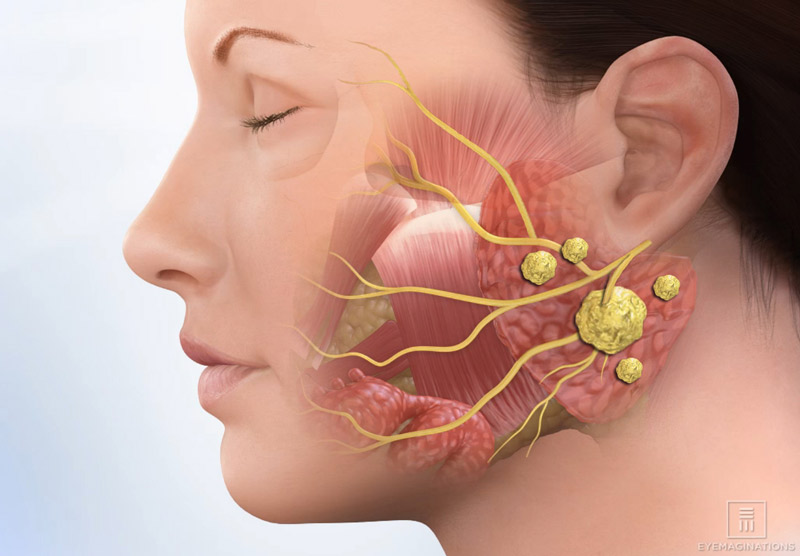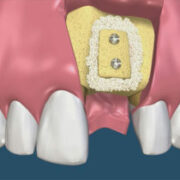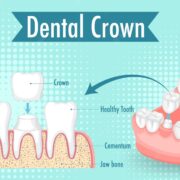Implantation is a widely recognized and successful procedure in modern dentistry for restoring missing teeth. While the focus is often on the integration of the dental implant with the jawbone, it is important to also consider the role of the salivary glands in the overall success and functionality of the implant. The salivary glands play a crucial role in maintaining oral health by producing saliva, which serves various functions such as lubricating the oral tissues, aiding in digestion, and protecting against oral infections. Therefore, it is essential to understand the interaction between dental implants and the salivary gland to ensure optimal outcomes for patients.
Considerations for Implantation | Salivary Gland
One of the key considerations is the placement of dental implants in relation to the salivary glands. Careful planning and assessment are necessary to avoid damage to the salivary glands during the implantation process. The proximity of the implants to the major salivary glands, such as the parotid and submandibular glands, should be taken into account to minimize the risk of injury and potential complications.
Additionally, patients should be educated about the importance of maintaining good oral hygiene and staying hydrated to support salivary gland function.
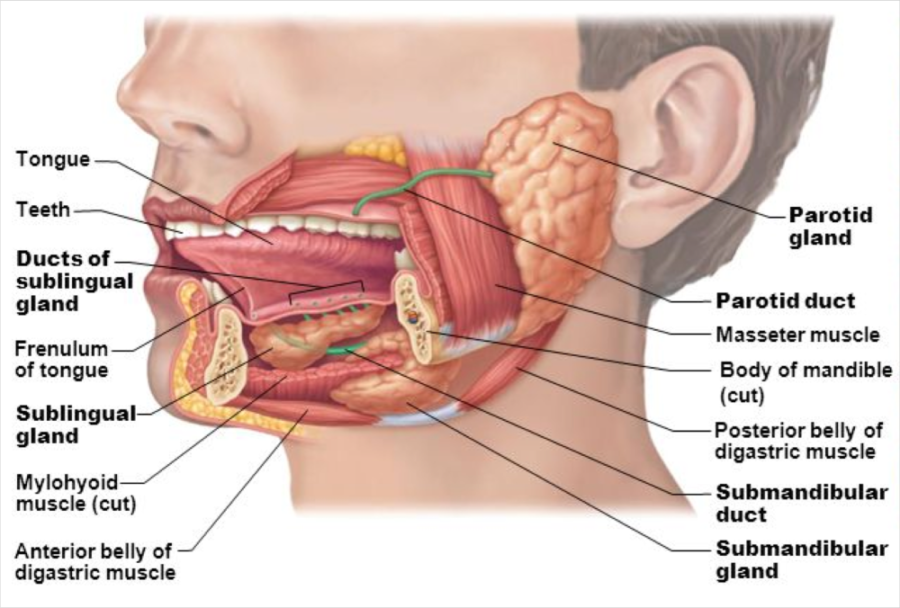
Another important aspect is the impact of dental implants on salivary flow. Studies have shown that dental implant placement can sometimes lead to alterations in salivary flow rate and composition. This can affect the overall oral health and comfort of patients, as changes in salivary flow can contribute to dry mouth (xerostomia) and an increased risk of dental caries and oral infections.
Proper post-implantation care and maintenance are essential to ensure the optimal functioning of the salivary glands. Regular dental check-ups, oral hygiene practices, and professional cleanings can help monitor the health of the salivary glands and address any issues promptly.
What are Dental Implants?
Dental implants are artificial tooth roots made of titanium that are surgically placed into the jawbone. The implant serves as a foundation for a crown, bridge, or denture. They are a long-term solution to missing teeth and offer several benefits, including improved chewing ability and a more natural appearance.
What are Salivary Gland Disorders?
Salivary gland disorders are conditions that affect the salivary glands responsible for producing saliva. The salivary glands are located in the mouth, and their primary function is to produce saliva, which plays a crucial role in oral health. Saliva helps to lubricate the mouth, making it easier to swallow and speak. Additionally, saliva contains enzymes that help to break down food, making it easier to digest.
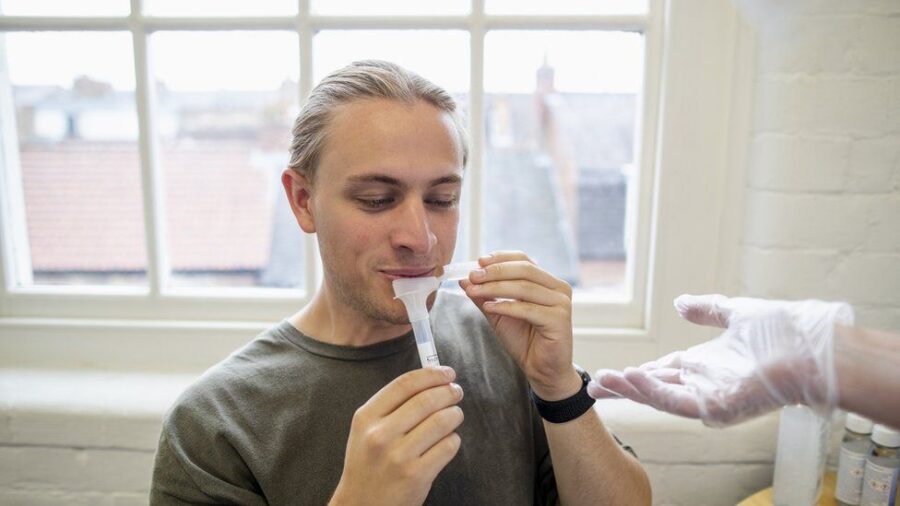
There are several types of salivary gland disorders, including salivary gland infections, salivary gland stones, and Sjogren’s syndrome. Salivary gland infections occur when bacteria or viruses infect the salivary glands, leading to inflammation and swelling. Salivary gland stones are caused by the buildup of calcium and other minerals in the salivary glands, leading to the formation of small stones that can block the gland’s ducts. Sjogren’s syndrome is an autoimmune disorder that affects the salivary glands, causing them to produce less saliva.
Risks and Complications of Dental Implants
Implantation is a safe and effective way to replace missing teeth, but like any medical procedure, they do come with some risks and potential complications.
Infection: As with any surgical procedure, there is a risk of infection. Your dentist will prescribe antibiotics to reduce the risk of infection.
Nerve damage: Nerves in the surrounding area can be damaged during the placement of the implant, which can cause pain, numbness, or tingling in the mouth, chin, or lips. This is a rare complication, and your dentist will take steps to minimize this risk.
Implant failure: In rare cases, the implant may not integrate properly with the jawbone, leading to implant failure. This can occur due to a variety of factors, such as poor oral hygiene, smoking, or medical conditions that affect bone healing.
Sinus problems: Implants in the upper jaw can sometimes extend into the sinus cavity, which can cause sinus problems.
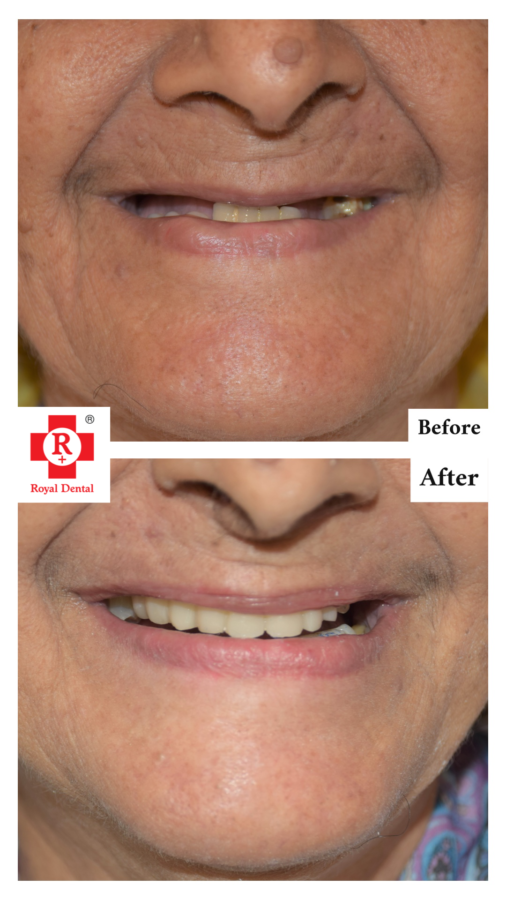
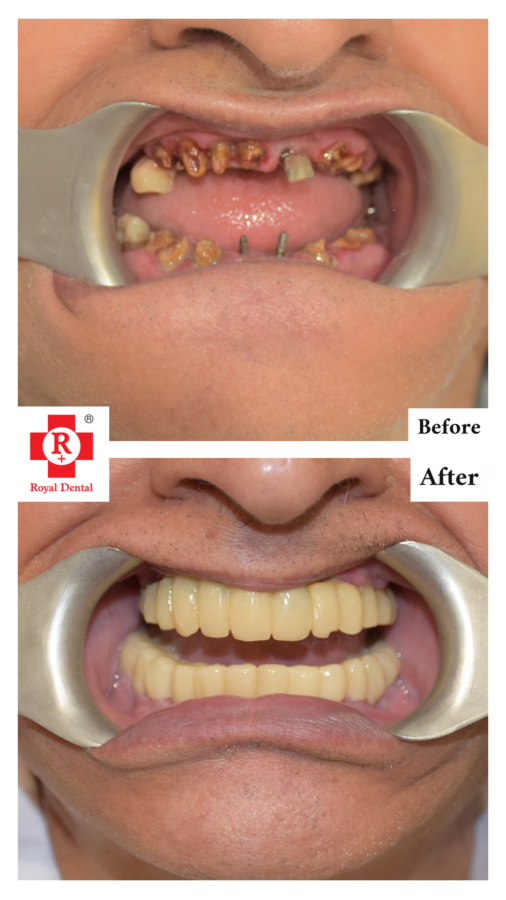
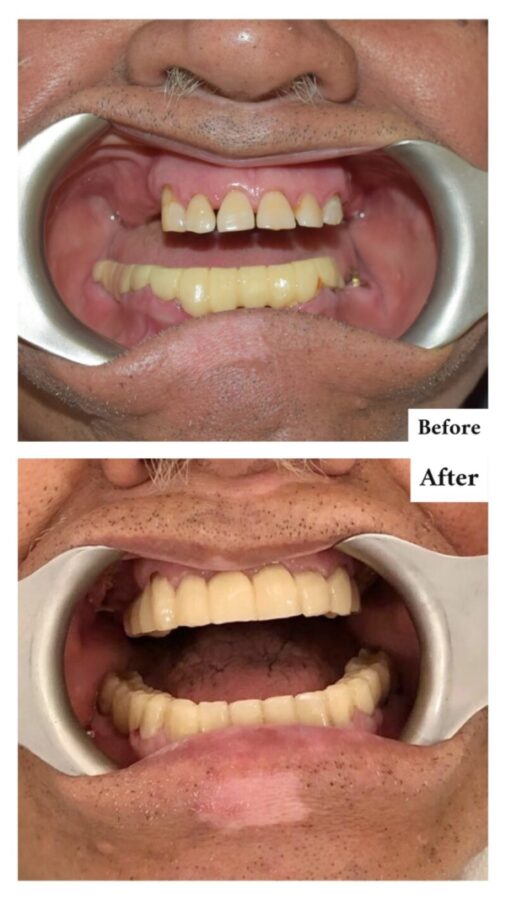
Here are some more common complications associated with dental implantation:
Allergic reactions: Some patients may have an allergic reaction to the materials used in the implant or crown.
Pain or discomfort: You may experience pain, swelling, or discomfort after the implant placement surgery, but this can usually be managed with over-the-counter pain medication.
Gum recession: In rare cases, the gum tissue around the implant may recede, exposing the implant or crown.
It is important to discuss any potential risks and complications with your dentist before undergoing the implant placement procedure. Your dentist will take steps to minimize the risk of complications and ensure that the procedure is safe and effective. With proper care and maintenance, dental implants can last for many years and provide a permanent solution for missing teeth. Dr. Chirag Chamria at Royal Dental Clinics is an experienced dentist who can help you determine if implantation is the right option for you and provide personalised care and support.
Causes and Symptoms of Salivary Gland Disorders
Causes:
Salivary gland stones: These are small stones that form in the salivary glands and block the flow of saliva.
Viral infections: Certain viral infections, such as mumps, can cause inflammation of the salivary glands.
Bacterial infections: Bacterial infections, such as those that cause pneumonia, can also affect the salivary glands.
Autoimmune disorders: Autoimmune disorders, such as Sjogren’s syndrome, can cause inflammation of the salivary glands.
Dehydration: Dehydration can cause reduced saliva flow, which can lead to salivary gland disorders.
Medications: Certain medications, such as antihistamines and antidepressants, can cause reduced saliva flow and increase the risk of salivary gland disorders.
Symptoms:
Pain or swelling in the salivary glands: This can be caused by inflammation or infection of the salivary glands.
Dry mouth: Reduced saliva flow can cause dry mouth, which can make it difficult to eat, swallow, and speak.
Bad breath: Reduced saliva flow can also lead to bad breath, as bacteria can accumulate in the mouth.
Difficulty eating or speaking: Swelling or pain in the salivary glands can make it difficult to eat or speak.
Mouth sores: Inflammation of the salivary glands can cause mouth sores.
Fever: Some salivary gland disorders, such as viral infections, can cause a fever.
Relation: Implantation and Salivary Gland Disorders
There is a relationship between implantation and salivary gland disorders, as both can affect oral health and overall wellbeing. Salivary gland disorders can lead to dry mouth, which can increase the risk of implant failure. Additionally, saliva plays a crucial role in oral health, helping to prevent infection and decay. Therefore, if you have a salivary gland disorder, it’s essential to manage it effectively before considering dental implants.
Conversely, implants can also affect salivary gland function. The implant procedure can lead to temporary or permanent damage to the salivary glands, leading to dry mouth. Additionally, the implant material can cause an immune response in some people, leading to inflammation and swelling in the surrounding tissues. Therefore, it’s essential to discuss the potential risks and complications of implants with your dentist before undergoing the procedure.
Considerations for Patients with Salivary Gland Disorders
Patients with salivary gland disorders may experience various symptoms, such as dry mouth, pain, swelling, and difficulty eating or speaking. Here are some considerations for patients with salivary gland disorders:
Oral hygiene: Good oral hygiene is important for patients with salivary gland disorders. Regular brushing and flossing can help prevent tooth decay and gum disease, which can be exacerbated by reduced saliva flow.
Fluid intake: Patients with salivary gland disorders may experience reduced saliva flow, which can lead to dry mouth. It is important to increase fluid intake, particularly water, to help keep the mouth moist and reduce the risk of tooth decay.
Dietary changes: Patients with salivary gland disorders may find it difficult to eat certain foods, particularly those that are hard, crunchy, or dry. Soft foods, such as soups and stews, may be easier to eat.
Medications: Some medications may be prescribed to stimulate saliva production or reduce inflammation and pain. It is important to take medications as prescribed and to discuss any potential side effects with your dentist.
Sialendoscopy: Sialendoscopy is a minimally invasive procedure that can be used to diagnose and treat salivary gland disorders. It may be recommended for patients who have persistent symptoms despite other treatments.
Surgery: In some cases, surgery may be necessary to remove a salivary gland or a tumor. Your dentist will discuss the risks and benefits of surgery and help you make an informed decision.
Follow-up care: Regular follow-up appointments with your dentist are important for monitoring the progress of your salivary gland disorder and adjusting your treatment plan as needed.
Factors to Consider before Getting Dental Implants
Overall health: Dr. Chamria will review your medical history and overall health to determine if you are a good candidate for dental implants. Certain health conditions such as uncontrolled diabetes or autoimmune diseases may affect the success of the implant procedure.
Bone density: Dental implants require a certain amount of healthy bone to be successful. Dr. Chamria will evaluate your bone density to determine if you have enough bone to support the implant.
Oral health: Good oral health is essential for the success of dental implants. Dr. Chamria will evaluate your oral health to ensure that your gums and teeth are healthy enough for the implant procedure.
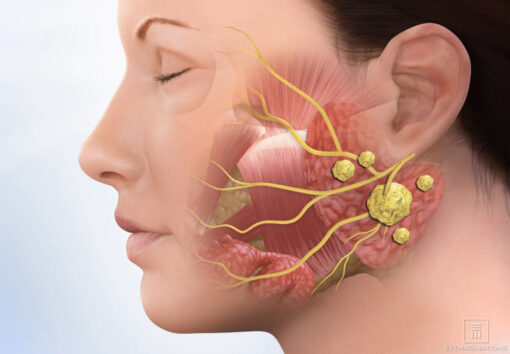
Dr. Chirag Chamria at Royal Dental Clinics is a highly skilled and experienced dentist who can help you determine if implantation is the right option for you. Here are some important factors to consider before getting dental implants with Dr. Chirag Chamria:
Smoking: Smoking can significantly impact the success of dental implants. Dr. Chamria will discuss the risks associated with smoking and recommend that you quit smoking before undergoing the implant procedure.
Cost: Dr. Chamria will discuss the cost of dental implants with you and help you understand the investment in your oral health and quality of life.
Maintenance: Dr. Chamria will discuss the proper care and maintenance required for dental implants to ensure their long-term success. This includes regular brushing and flossing, as well as routine dental checkups and cleanings.
Your dentist’s experience: Dr. Chamria has extensive experience in dental implant placement and can help you feel confident in your decision to undergo the procedure..
Treatment Options for Salivary Gland Disorders
Salivary gland disorders can have various causes, such as infections, blockages, tumors, or autoimmune conditions. The treatment options depend on the underlying cause of the disorder. Here are some common treatment options that may be offered at Royal Dental Clinics:
Medications: If the salivary gland disorder is caused by an infection, antibiotics may be prescribed. Anti-inflammatory medications or steroids may also be used to reduce inflammation and pain.
Salivary gland massage: This technique can be used to stimulate saliva production and relieve blockages. The dentist may recommend gentle massage of the affected gland.
Sialendoscopy: This minimally invasive procedure involves the use of a small camera to examine the salivary ducts and remove any blockages.
Surgery: If the salivary gland is severely damaged, infected or if there is a tumor present, surgery may be required. Surgical procedures may include removal of the affected gland or tumor, or repairing a blockage in the duct.
Radiation therapy: Radiation therapy may be used in the treatment of salivary gland tumors or other conditions.
Lifestyle changes: Certain lifestyle changes can be helpful in treating salivary gland disorders. This may include increasing fluid intake, avoiding caffeine and alcohol, and practicing good oral hygiene.
The specific treatment options recommended for you will depend on the underlying cause of your salivary gland disorder, as well as other factors such as your overall health and medical history. It is best to consult with a dentist or oral surgeon at Royal Dental Clinics to discuss the best treatment plan for you.
Choosing the Right Dentist
Patients interested in getting implantation, especially those who have problems with their salivary glands, need to be selective when choosing a dentist. In addition to our standard dental procedures, we at Royal oral Clinics also provide in-depth examinations of patients’ oral health. We are going to work together to determine the kind of treatment that will be most beneficial to you.
Managing Risks and Complications of Dental Implants
Choose an experienced dentist: The most important factor in reducing the risk of complications is to choose an experienced and qualified dentist, like Dr. Chirag Chamria at Royal Dental Clinics, who has a proven track record of success with dental implants. An experienced dentist will take every precaution to minimize risks and ensure the best possible outcome.
Follow pre- and post-operative instructions: Your dentist will provide you with detailed instructions on how to prepare for the procedure and how to care for your implants after surgery. It is important to follow these instructions carefully to reduce the risk of complications.
Maintain good oral hygiene: Good oral hygiene is essential for preventing infections and other complications. Be sure to brush and floss regularly and see your dentist for regular check-ups and cleanings.
Avoid smoking: Smoking can increase the risk of implant failure and other complications. If you are a smoker, it is important to quit or at least reduce your smoking before and after the procedure.
Attend follow-up appointments: Your dentist will schedule follow-up appointments to monitor your healing progress and check the stability of your implants. It is important to attend these appointments to ensure that any potential problems are detected and addressed early on.
Watch for signs of complications: If you experience any unusual pain, swelling, or other symptoms, contact your dentist immediately. Early detection and treatment of complications can help prevent more serious problems from developing.
Conclusion
Our patients’ health and well-being comes first at Royal Dental Clinics, and we provide tailored care plans for individuals with complex dental needs. If you’re considering dental implants but are experiencing issues with your salivary glands, please get in contact with us so that we can schedule a consultation and go through your options. In conclusion, while implantation offer a reliable and aesthetically pleasing solution for missing teeth, it is crucial to consider the interaction between implants and the salivary glands. Proper planning, placement, and post-operative care are essential to ensure the long-term success and overall oral health of patients undergoing implantation. By understanding and addressing the relationship between implants and salivary gland function, dental professionals can provide comprehensive care that optimizes patient outcomes and satisfaction.

